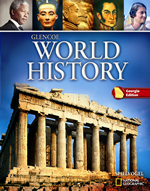Glencoe World History © 2012 Georgia EditionChapter 14:
Crisis and Absolutism in Europe, 1550-1715Web Activity Lesson PlansWho was Shakespeare? Introduction For more than a century, debate has raged over the true identity of William Shakespeare. The historical record provides little information on the man, and some scholars doubt his existence. Mark Twain and many others claimed there was no Elizabethan playwright by the name of Shakespeare. In this activity students will review the recent history of the debate to learn about the period of English history during which Shakespeare's plays were written. Lesson Description
Students will go to a Web site that debates the authorship of Shakespeare. After reading an overview of the debate, students will answer four questions about what they have read. Students will then write their own article, expressing their opinions on the debate about the identity of Shakespeare. Instructional Objectives
The learner will be able to review and summarize a historical debate.
The learner will be able to apply what he or she has learned to write a personal argument about the identity of Shakespeare. Student Web Activity Answers - People have doubted the ability of a sixteenth-century English commoner to gain the knowledge and skills required to write Shakespeare's plays. Also, there are no records to prove that Shakespeare wrote the plays.
- Mark Twain, Samuel Taylor Coleridge, Sigmund Freud, Ralph Waldo Emerson, Walt Whitman, and Henry James are some of the people who have doubted Shakespeare’s authorship.
- Some have suggested that Francis Bacon, Ben Johnson, Christopher Marlowe, or Edward de Vere was the real William Shakespeare. According to the article, Edward de Vere is the most likely author.
- The fact that de Vere died before some of the plays were written brings out doubts about de Vere’s authorship.
- Students' articles will vary but should include appropriate information from their textbook, the Web site, or additional research.
 | 

















